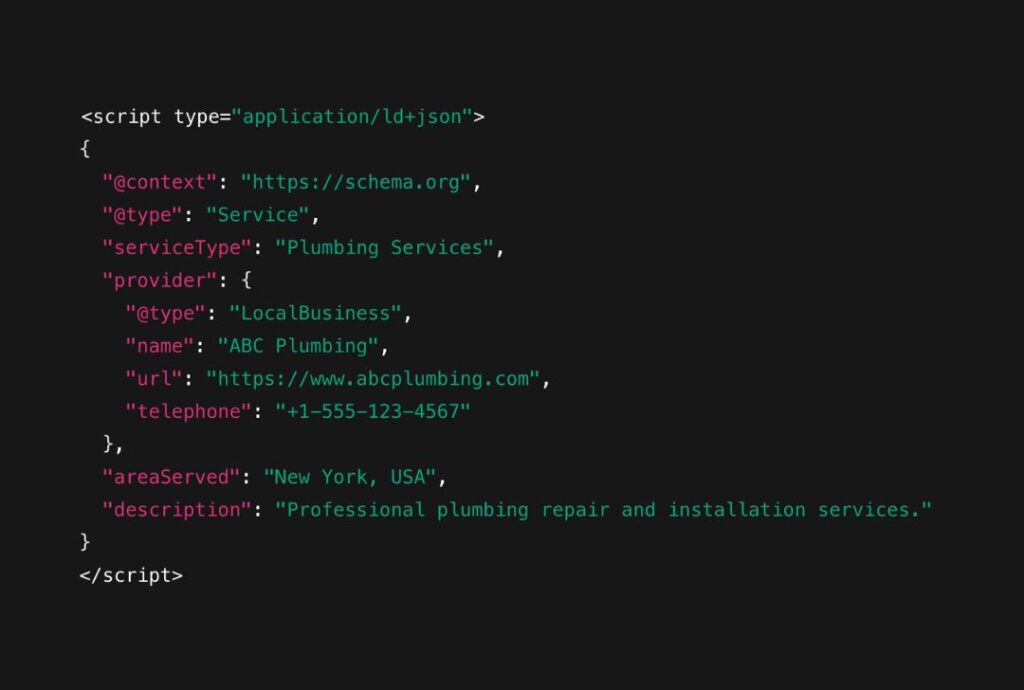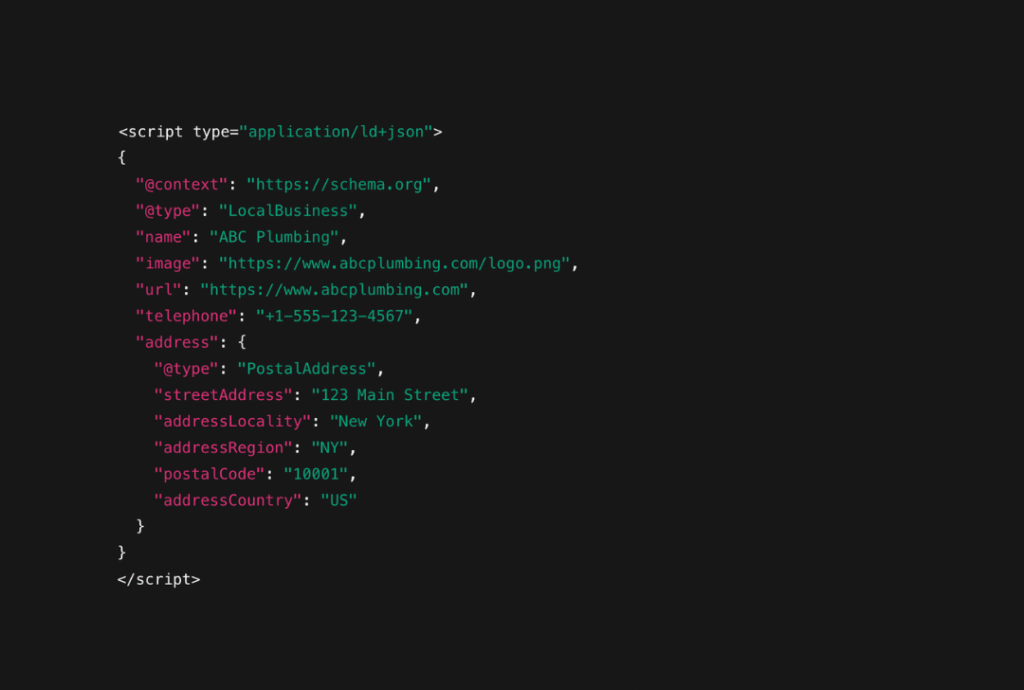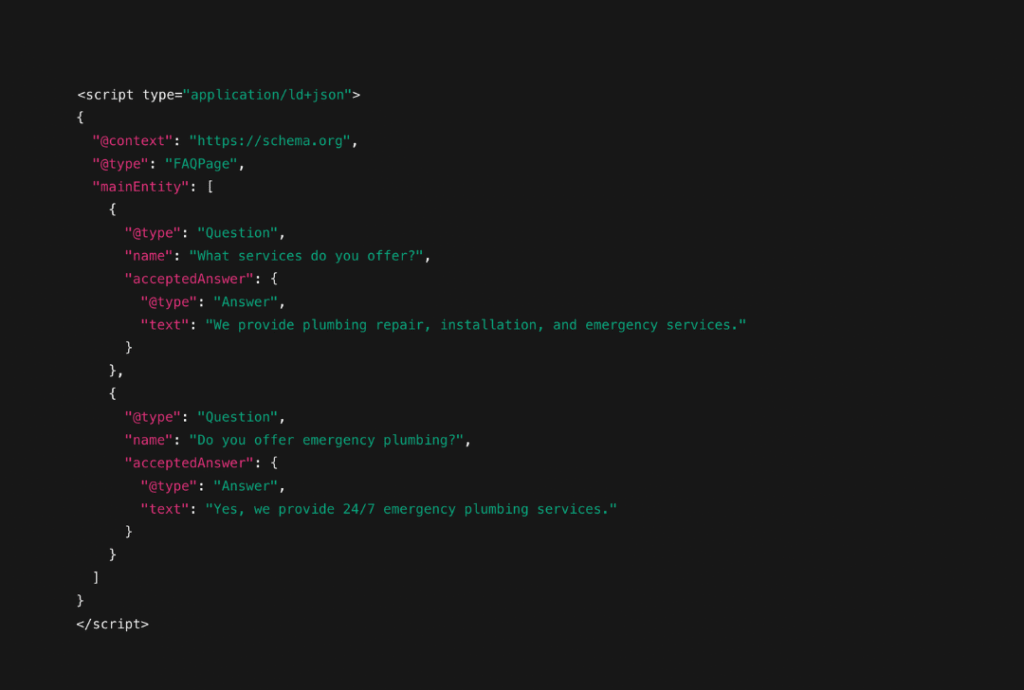If you’ve ever searched for a business online and noticed results with star ratings, FAQs, product details, or other special highlights, you’ve already seen schema markup in action.
In simple terms, schema markup is a type of code that you place on your website to help search engines better understand your content.
Think of it like adding a label to a jar in your pantry. Without the label, you know the jar has something inside, but it’s not obvious whether it’s sugar, salt, or flour.
With a clear label, anyone opening the pantry immediately knows what’s in the jar. Similarly, schema markup provides labels that tell search engines exactly what your content means, not just what it says.
A more technical definition of schema markup
From a technical perspective, schema markup is a structured data vocabulary created by Schema.org, a collaborative project between major search engines like Google, Bing, Yahoo, and Yandex. Structured data is formatted in a standardized way (often using JSON-LD, RDFa, or Microdata) so that search engines can read and interpret web content more effectively.
For example, if you run a marketing consultancy firm and publish a testimonial on your website, schema markup can explicitly tell Google:
- This is a review.
- It’s about a service.
- The review has a rating of 5 out of 5.
Without schema markup, Google just sees text. With schema markup, it sees the context. That additional context allows your content to appear with enhanced features, such as review stars or “featured snippets” in search results.
Why Schema Markup Matters for Marketing Consultants and Professional Service Firms
Marketing consultants and other professional service providers, lawyers, accountants, coaches, or agencies, often face a competitive online environment.
Schema markup helps such firms stand out, drive more qualified traffic, and communicate credibility. Let’s explore why it’s important.
1. Improved search engine understanding
Search engines are incredibly sophisticated, but they still rely on structured signals to fully grasp the intent of content. Schema markup acts as a translator between your website and search engines.
For instance, if you have a “Services” page listing strategy sessions, digital marketing audits, and consulting packages, schema markup helps Google understand these as Service offerings, not just general text. This ensures your site is categorized correctly and displayed for the right queries.
For professional service firms, where expertise and trust are crucial, ensuring search engines understand exactly what you offer is essential.
2. Enhanced visibility with rich snippets
Rich snippets are upgraded search results that include additional information beyond the usual title and description. Examples include:
- FAQ schema → Displays commonly asked questions directly in the search results.
- Review schema → Shows star ratings and testimonials.
- Organization schema → Highlights your business logo, contact information, and social links.
- Local business schema → Displays your office location, hours, and phone number.
For a marketing consultant, having an FAQ snippet appear for a query like “How do I choose a digital marketing consultant?” gives you more real estate in the search results and makes you appear more authoritative.
3. Higher click-through rates (CTR)
When your search results stand out visually, through stars, FAQs, or service details, they naturally attract more clicks. Studies have shown that rich results can boost click-through rates significantly because users perceive them as more credible and helpful.
For example, imagine two results:
- A plain link to “XYZ Marketing Consultancy.”
- A result with XYZ’s name, a star rating, a snippet about their digital strategy services, and a link to FAQs.
Most users will choose the second option, even if both are ranked similarly. Schema markup doesn’t just get you found, it gets you clicked.
4. Local SEO benefits
For professional service firms that rely on local clients, schema markup can strengthen local SEO signals. By implementing LocalBusiness schema, you provide search engines with structured details like:
- Your business name
- Address
- Phone number (NAP data)
- Opening hours
- Geo-coordinates
This increases the likelihood of appearing in the Google Local Pack or Maps results. For example, a marketing consultant in New York who uses LocalBusiness schema may show up more prominently when someone searches for “marketing consultant near me” or “digital marketing services NYC.”
5. Competitive advantage
Many consultants and service firms still overlook schema markup, considering it too technical or optional. By adopting it early and comprehensively, you gain an edge over competitors whose search listings remain basic.
Schema markup isn’t just about keeping up, it’s about positioning yourself as more trustworthy and professional in the digital space. For clients comparing multiple firms, a result that looks polished and informative can tip the decision in your favor.
6. Better user experience
Ultimately, schema markup contributes to a smoother and more helpful user experience. When potential clients see FAQs, services, reviews, or event dates directly in search results, they find answers faster and are more likely to engage with your firm.
For example, if you host webinars or workshops, Event schema can display upcoming sessions directly in search results, making it easier for prospects to sign up. Schema bridges the gap between your expertise and the audience looking for it.
What Schema Markup Will Not Do
While schema markup is powerful, it’s important to manage expectations. Misunderstandings often lead to disappointment when results don’t align with inflated hopes. Here’s what schema markup will not do:
1. Not a direct ranking factor
Google has stated that schema markup is not a direct ranking factor. Adding structured data alone won’t push your site from page 5 to page 1 overnight. Instead, it enhances how your content is displayed, which indirectly improves engagement signals like CTR, which may then support better rankings.
Think of it like dressing up for an interview. The clothes don’t make you more qualified, but they make you more appealing to decision-makers. Similarly, schema makes your content more appealing in search results.
2. Won’t fix broader SEO issues
If your website has serious SEO problems, like slow load times, thin content, or poor backlink profiles, schema markup won’t magically solve them. Structured data is a supplement to good SEO practices, not a replacement.
A poorly optimized site with schema is still a poorly optimized site. Marketing consultants and professional service firms should first ensure they have a solid foundation: quality content, fast-loading pages, mobile responsiveness, and strong technical SEO. Schema then amplifies those efforts.
3. Won’t deliver instant results
Implementing schema doesn’t guarantee immediate changes in how your search results appear. Google decides whether or not to display rich snippets, and sometimes it takes weeks for changes to reflect.
Additionally, not every type of schema leads to visible enhancements. Some structured data is used behind the scenes to better categorize content, even if users don’t see a visible difference. Patience and consistency are key, schema is part of a long-term SEO strategy, not a quick hack.
Types of Schema Markup Relevant to Marketing Consultants & Service Firms
Schema markup is not “one size fits all.” Different types of structured data apply depending on your goals, the services you offer, and the content you publish. For marketing consultants and professional service firms, several schema types are especially valuable. Let’s break them down one by one.
1. Service Schema Markup

Service schema is specifically designed to describe the professional services your business provides. This is particularly useful for consultants because it communicates to search engines that you’re not just sharing random information, you’re offering well-defined services.
Why it matters for consultants and service firms:
- You can explicitly list each service you provide, such as “Digital Marketing Strategy,” “SEO Consulting,” or “Brand Development.”
- Search engines gain clarity on what your firm specializes in, making it easier to match your site with relevant search queries.
- Potential clients may see your service information directly in search results, increasing relevance and trust.
Example use case:
A marketing consultant could mark up their “Services” page so Google knows each service is distinct. This might help the site appear for queries like “social media marketing consultant” or “PPC strategy services.”
2. Local Business Schema Markup

Local Business schema provides structured data about your company’s location, contact details, hours, and other business information.
Why it matters for consultants and service firms:
Many service providers rely on a geographic client base. Even if you work online, having a physical office location helps with credibility and local SEO. Local Business schema signals to search engines:
- Where you are located
- How to contact you
- When you’re available
- What area you serve
Benefits include:
- Greater chances of appearing in the Google Local Pack (the map results at the top of local searches).
- Stronger alignment with “near me” searches.
- Increased trust for users who prefer hiring a local consultant or firm.
Example use case:
A consultancy in Chicago could use Local Business schema to ensure that when someone searches “marketing consultant near me” in the Chicago area, their office appears prominently with contact details.
3. Person Schema Markup
Person schema is designed to provide information about an individual professional. This is especially useful for solo consultants, coaches, and personal brands.
Why it matters:
- Consultants often build credibility around themselves as experts, not just their business.
- Person schema lets you mark up details such as your name, title, credentials, education, and social profiles.
- This can help Google create a Knowledge Panel (the info box on the right side of search results) for your name.
Benefits for consultants:
- Stronger personal branding in search results.
- Easier for clients to verify your expertise.
- Increased visibility for professionals who are thought leaders, authors, or speakers.
Example use case:
If someone searches for “Jane Smith marketing consultant,” Person schema could help display Jane’s profile photo, job title, and links to her official website and LinkedIn.
4. FAQ Schema Markup

FAQ schema is applied to pages that contain a list of questions and answers.
Why it matters for consultants and service firms:
- Many potential clients have similar questions: “How much does consulting cost?” or “What industries do you specialize in?”
- Adding FAQ schema allows these questions and answers to appear directly in Google search results, increasing your visibility.
- It positions you as helpful and authoritative, even before users click through.
Benefits include:
- More space in search results, pushing competitors down the page.
- Improved user trust, since you’re addressing client concerns upfront.
- Potential for voice search optimization, as FAQs often match conversational queries.
Example use case:
A consulting firm’s FAQ page could display questions like “How long does a typical marketing strategy project take?” directly on Google’s results page, making it more likely that searchers click through.
5. Article / BlogPosting Schema Markup
What it is:
Article and BlogPosting schema help search engines understand that a piece of content is an article, news post, or blog post.
Why it matters for consultants and service firms:
Content marketing is a major strategy for service providers. By publishing blog posts, case studies, or thought leadership pieces, you demonstrate expertise. Article schema helps search engines correctly interpret and highlight this content.
Benefits include:
- Increased chance of appearing in Google News or the “Top Stories” carousel.
- Enhanced search listings that include author names, dates, and images.
- Better alignment with long-tail keywords from your blog strategy.
Example use case:
If a consultant publishes a blog post titled “5 Marketing Trends for 2025,” Article schema could help it appear with an image thumbnail and author name in search results.
6. Review Schema Markup
What it is:
Review schema is used to highlight ratings, testimonials, and client feedback.
Why it matters:
- Professional service firms thrive on trust and credibility. Displaying client reviews in search results helps build both.
- Review schema can trigger star ratings in your Google listing, which significantly improves click-through rates.
Benefits include:
- Enhanced credibility at a glance.
- Increased trust before users even visit your site.
- Higher likelihood of being chosen over competitors without visible reviews.
Example use case:
A marketing consultant who has a page of client testimonials could use Review schema to display a 4.9-star rating in Google search, making their listing more appealing.
How Schema Markup Works Behind the Scenes
Now that we’ve looked at the schema types most relevant to consultants and service firms, let’s explore what happens behind the curtain.
How search engines read structured data
- Crawling:
Search engine bots (like Googlebot) crawl your site, reading both visible content and underlying code. - Detecting structured data:
If your site includes JSON-LD (the most recommended format), search engines can quickly parse the schema markup without confusion. - Interpreting context:
Schema markup provides explicit labels. Instead of seeing a string like “Marketing Consultant – Jane Smith – 5 Stars,” Google interprets:
- “Jane Smith” = Person
- “Marketing Consultant” = Job Title
- “5 Stars” = Aggregate Rating
- Indexing:
The search engine then stores this structured information in its index, attaching additional attributes to your page.
How schema influences search display
While schema itself is not a ranking factor, it changes how your content appears in search results:
- Rich Snippets: Search engines may show stars, FAQs, images, or service details.
- Knowledge Panels: For individuals or firms with Person or Organization schema.
- Local Pack Enhancement: For Local Business schema, improving map visibility.
- Voice Search Optimization: Schema helps voice assistants retrieve direct answers.
Behind the scenes:
When Google evaluates which results to display, schema markup provides extra context that increases your chances of being selected for enhanced features. However, it’s ultimately up to Google’s algorithms whether your structured data is shown.
Step-by-Step Guide to Implementing Schema Markup
Implementing schema markup may sound technical, but the process is manageable once you break it into clear steps. Whether you’re a solo marketing consultant or managing a professional service firm, the following guide will help you implement schema systematically.
Step 1: Identify Relevant Schema Types
Before you dive into code, you need to decide which schema types will benefit your business the most. Not all structured data applies to every website, so choosing carefully ensures your implementation is strategic rather than cluttered.
For consultants and service firms, the most relevant schema types are:
- Service schema → Describes the consulting services you offer.
- Local Business schema → Provides location and contact details.
- Person schema → Highlights your personal brand or expertise.
- FAQ schema → Displays client questions and answers.
- Article/BlogPosting schema → Optimizes your content marketing efforts.
- Review schema → Showcases client testimonials and ratings.
The rule of thumb: only implement schema that genuinely reflects your website’s content.
Step 2: Use Tools to Generate Schema
Not everyone is comfortable writing JSON-LD code by hand. Luckily, there are tools that generate schema markup for you.
- Google’s Structured Data Markup Helper: A beginner-friendly tool where you highlight parts of your webpage (like your business name or services), and it generates the schema code.
- Schema.org documentation: Provides detailed schema types and definitions for developers or advanced users.
- WordPress plugins:
- Yoast SEO (Pro) → Offers built-in structured data support.
- Rank Math → Another SEO plugin with schema generation features.
- Schema Pro → Specifically designed to add structured data to WordPress sites.
- Yoast SEO (Pro) → Offers built-in structured data support.
These tools ensure accuracy and save time, especially for consultants who prefer focusing on client work instead of code.
Step 3: Test and Validate Schema with Google’s Rich Results Test
Adding schema isn’t enough, you must test it to make sure search engines can read it.
Google provides the Rich Results Test (search “Google Rich Results Test”) where you can:
- Paste your page URL or raw code.
- See if Google detects structured data.
- Check whether your schema qualifies for rich results.
If there are errors or warnings, the tool will highlight them so you can fix issues before going live.
Think of this step as proofreading your schema markup before publishing it.
Step 4: Add Schema Markup to Your Website
Now comes implementation. You have two main options:
Option 1: Manual Implementation
- Insert JSON-LD schema code directly into the <head> section of your web pages.
- Requires comfort with editing HTML or working with a developer.
- Offers maximum control and customization.
Option 2: Plugin-Based Implementation
- Use SEO plugins like Yoast Pro, Rank Math, or Schema Pro.
- Ideal for WordPress-based sites and non-technical users.
- Quick, user-friendly, and automatically updates schema when you update your content.
Manual coding is best for custom sites or if you want fine control, while plugins are perfect for consultants who want efficiency.
Step 5: Monitor and Optimize Over Time
Schema markup is not “set it and forget it.” To maximize its benefits, you should monitor performance and adjust as needed.
Ways to monitor:
- Google Search Console → Provides a “Rich Results” report showing how your schema is performing.
- CTR tracking → Monitor whether your search listings with schema are generating higher click-through rates.
- Audit periodically → Ensure your schema is still accurate after content or service updates.
Like SEO itself, schema requires ongoing care to remain effective.
Step 6: Pair Schema Markup with High-Quality Content
Schema is a supporting actor, not the star of the show. Its role is to help search engines understand and enhance your content, not replace it.
- If your content is shallow or outdated, schema won’t magically make it rank.
- Rich results are most effective when paired with well-written, authoritative, and user-focused content.
Think of schema as the polish that makes your already-valuable content shine brighter in search results.
Common Mistakes to Avoid
While schema markup can be powerful, many consultants and firms misuse it. Avoiding these mistakes will keep your SEO strategy ethical and effective.
1. Using irrelevant or misleading schema
Example: Adding “Product schema” to a consulting service that isn’t actually a product. Misrepresentation can result in Google ignoring your schema, or worse, penalizing your site.
2. Overstuffing schema for SEO manipulation
Some businesses try to add every possible schema type, even if unnecessary. This creates confusion and signals manipulation. Always stick to schema types that genuinely reflect your content.
3. Forgetting to update structured data when content changes
If you change your office hours, add a new service, or update testimonials, make sure your schema reflects it. Outdated schema can mislead users and damage trust.
4. Relying solely on plugins without validation
Plugins are convenient, but they’re not foolproof. Always validate your schema with Google’s Rich Results Test or Search Console.
The Role of Schema Markup in the Future of SEO
SEO is evolving, and schema markup is becoming increasingly critical. Here’s why:
1. AI-driven search and structured data
As search engines rely more on AI to deliver precise results, structured data acts as a reliable signal. Schema helps AI models understand entities (people, businesses, services) with clarity.
2. Voice search optimization
Voice assistants like Siri, Alexa, and Google Assistant often pull answers directly from structured data. FAQ and HowTo schema in particular are essential for voice search visibility.
3. Schema’s growing importance in entity-based SEO
Google is shifting toward an entity-first index, where it focuses on “things, not strings.” Schema helps define your entity (your business, services, or personal brand) so Google can confidently serve your information in knowledge panels, local packs, and featured snippets.
In short, schema is not just helpful now, it’s future-proofing your SEO.
Final Thoughts: Is Schema Markup Worth It?
ROI considerations for consultants and professional service firms
- Schema doesn’t directly increase rankings, but it boosts visibility and click-through rates.
- Rich results make your business look more professional and trustworthy.
- Local Business and Review schema, in particular, can drive more qualified leads.
Why schema markup should be part of a long-term SEO strategy
Schema is not a quick win, it’s a strategic investment. Over time, it:
- Improves user experience.
- Strengthens local and entity-based SEO.
- Positions your brand for AI-driven and voice-based search.
For consultants and service firms, schema markup is absolutely worth the effort. When paired with quality content and a solid SEO foundation, it becomes a sustainable driver of credibility, trust, and client acquisition.
Conclusion
Schema markup is no longer optional for consultants and professional service firms, it’s essential. By following the six-step process, choosing the right schema, generating it with tools, validating, implementing, monitoring, and pairing it with great content, you can unlock significant benefits.
Avoid common mistakes, embrace schema as part of your long-term SEO strategy, and you’ll not only improve your visibility today but also future-proof your brand for the evolving search landscape.At its core, schema markup is about clarity. The clearer you make your services, expertise, and credibility to search engines, the easier it becomes for potential clients to discover and trust you.
I am the Growth Head at SurgeAIo, where I oversee performance and conversion strategies for the brands we partner with. My role focuses on driving measurable results, optimizing campaigns, and ensuring sustainable growth. I work closely with teams to align marketing efforts with business objectives, leveraging data-driven insights to maximize ROI and client success.


